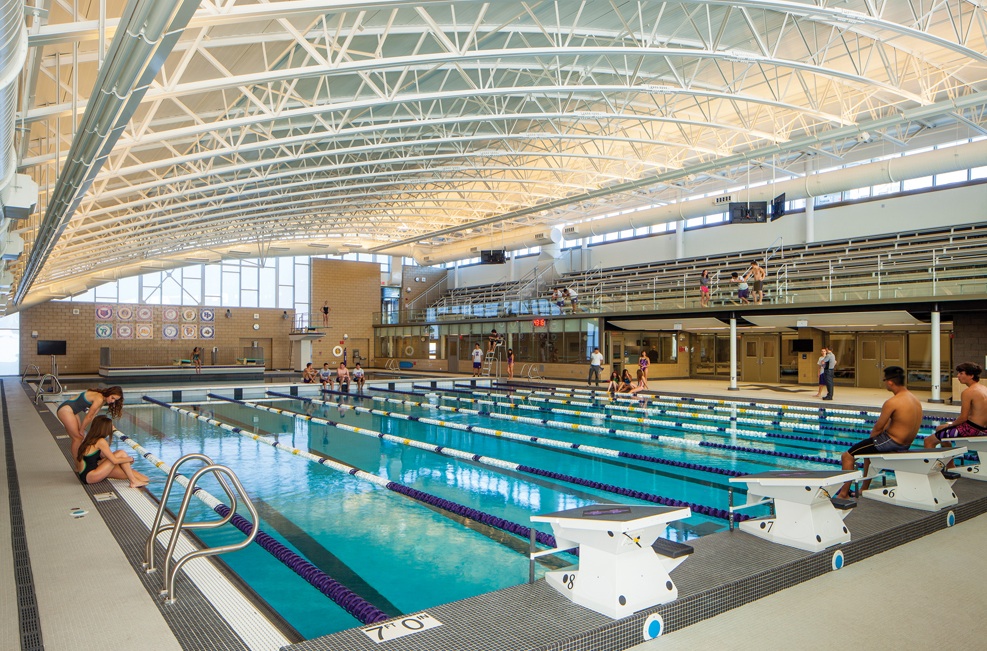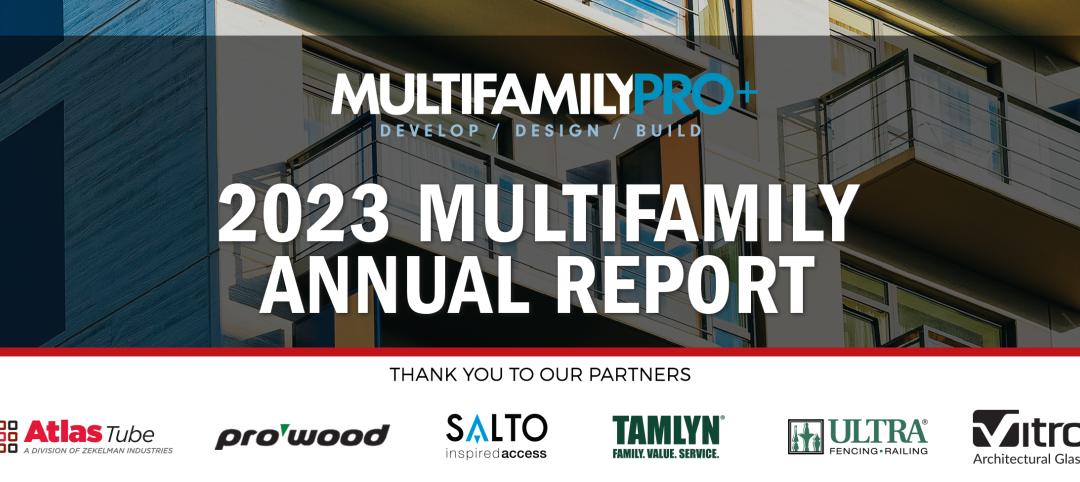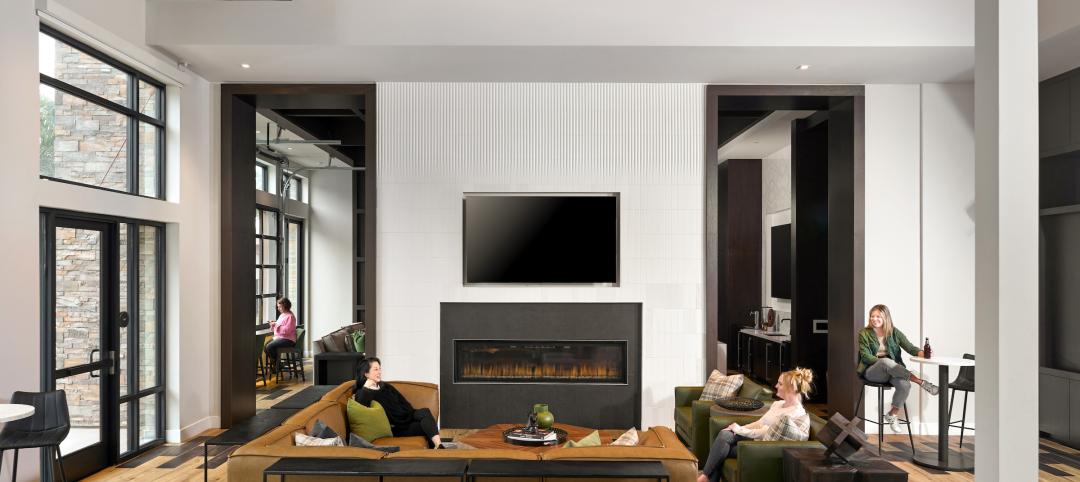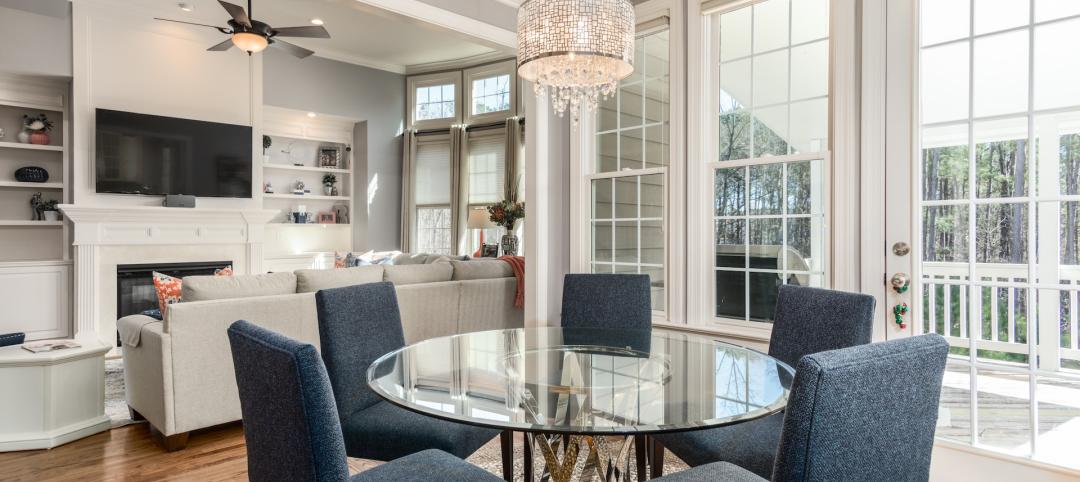The Building Team for the new Aquatics Center at Niles North High School in Skokie, Ill., included Chicago-area firms Legat Architects and IHC Construction—but a case could be made for listing a much larger group of official participants. The AEC firms made a concerted effort to involve not only district officials but also the user community. As a result, the project became a unique learning experience for students, staff, and neighbors.
The Niles North Aquatics Center serves 2,200 students—all of whom must take swimming—as well as 275 competitive student athletes in swimming, diving, and water polo. Feeder programs from park districts and local partners are also housed there. By 2012, the pool in the 48-year-old building was considered too small and shallow to meet current requirements.
Stakeholders asked for a new competition “cold pool,” a renovated community-accessible “warm pool,” a new public connecting corridor, locker room renovations, coaches’ offices, and meeting and storage space. Lighting and mechanical systems also needed an energy upgrade.
SILVER AWARD
Project summaryNiles North High School Aquatics Center
Skokie, Ill.BUILDING TEAM
Submitting firm: Legat Architects (architect)
Owner/developer: Niles Township High School District 219
Structural: KJWW Engineering Consultants
Mechanical/plumbing: AMSCO Engineering
Electrical: Hansen Palmer Associates
Civil: Gewalt Hamilton
CM: IHC Construction CompaniesGENERAL INFORMATION
Project size: 39,200 sf (24,600 sf new + 14,600 sf renovated)
Construction cost: $15 million
Construction period: April 2012 to August 2013
Delivery method: Design-bid-build
District 219 teamed with Legat Architects to plan the revitalization. Students and community members were surveyed regarding their priorities, and the Building Team held design workshops that elicited feedback for the floor plan. Daylighting is an important aspect of the final design, including a mix of clerestories, clear windows, translucent windows, and internal glazing to offer glare-free illumination and visual connections.
Eventually, the project was incorporated into the district’s architecture and engineering class curriculum. Biweekly tours were coordinated with faculty to focus on current classroom topics, and students were able to receive insights on various career paths.
“It became quite the living classroom,” says Building Team Awards judge Nathan Snydacker, PE, LEED AP, Vice President at Environmental Systems Design.
“It’s a lot of involvement you’d want in a school project of this type,” adds BTA judge Terry Fielden, LEED AP BD+C, Director of K-12 Education for International Contractors.
The Building Team phased construction over two summers to minimize disruption, keeping the community involved with a blog, video tours, signage with QR codes, and outreach to local news outlets.
In spring 2013, a severe flood created leaks in the lower-level filtration room. The damage stalled excavation and construction of the pool slab and walls, but IHC Construction, Legat, D219 staff, and other contractors managed to keep the job on schedule and within budget.
The result is a more functional, accessible, energy-efficient facility, designed to use 42% less water and 44% less energy than typical natatoriums. The project, whose heat-recovery dehumidification units should also sharply reduce CO2 emissions, is expected to become the first aquatic center in Illinois to achieve LEED for Schools Gold certification.
Related Stories
MFPRO+ Special Reports | Oct 27, 2023
Download the 2023 Multifamily Annual Report
Welcome to Building Design+Construction and Multifamily Pro+’s first Multifamily Annual Report. This 76-page special report is our first-ever “state of the state” update on the $110 billion multifamily housing construction sector.
Giants 400 | Oct 23, 2023
Top 190 Multifamily Architecture Firms for 2023
Humphreys and Partners, Gensler, Solomon Cordwell Buenz, Niles Bolton Associates, and AO top the ranking of the nation's largest multifamily housing sector architecture and architecture/engineering (AE) firms for 2023, as reported in Building Design+Construction's 2023 Giants 400 Report. Note: This ranking factors revenue for all multifamily buildings work, including apartments, condominiums, student housing facilities, and senior living facilities.
Affordable Housing | Oct 20, 2023
Cracking the code of affordable housing
Perkins Eastman's affordable housing projects show how designers can help to advance the conversation of affordable housing.
Senior Living Design | Oct 19, 2023
Senior living construction poised for steady recovery
Senior housing demand, as measured by the change in occupied units, continued to outpace new supply in the third quarter, according to NIC MAP Vision. It was the ninth consecutive quarter of growth with a net absorption gain. On the supply side, construction starts continued to be limited compared with pre-pandemic levels.
Warehouses | Oct 19, 2023
JLL report outlines 'tremendous potential' for multi-story warehouses
A new category of buildings, multi-story warehouses, is beginning to take hold in the U.S. and their potential is strong. A handful of such facilities, also called “urban logistics buildings” have been built over the past five years, notes a new report by JLL.
Building Materials | Oct 19, 2023
New white papers offer best choices in drywall, flooring, and insulation for embodied carbon and health impacts
“Embodied Carbon and Material Health in Insulation” and “Embodied Carbon and Material Health in Gypsum Drywall and Flooring,” by architecture and design firm Perkins&Will in partnership with the Healthy Building Network, advise on how to select the best low-carbon products with the least impact on human health.
Contractors | Oct 19, 2023
Crane Index indicates slowing private-sector construction
Private-sector construction in major North American cities is slowing, according to the latest RLB Crane Index. The number of tower cranes in use declined 10% since the first quarter of 2023. The index, compiled by consulting firm Rider Levett Bucknall (RLB), found that only two of 14 cities—Boston and Toronto—saw increased crane counts.
Office Buildings | Oct 19, 2023
Proportion of workforce based at home drops to lowest level since pandemic began
The proportion of the U.S. workforce working remotely has dropped considerably since the start of the Covid 19 pandemic, but office vacancy rates continue to rise. Fewer than 26% of households have someone who worked remotely at least one day a week, down sharply from 39% in early 2021, according to the latest Census Bureau Household Pulse Surveys.
Luxury Residential | Oct 18, 2023
One Chicago wins 2023 International Architecture Award
One Chicago, a two-tower luxury residential and mixed-use complex completed last year, has won the 2023 International Architecture Award. The project was led by JDL Development and designed in partnership between architecture firms Goettsch Partners and Hartshorne Plunkard Architecture.
Giants 400 | Oct 17, 2023
Top 130 Sports Facility Architecture Firms for 2023
Populous, Gensler, HOK, and HKS head BD+C's ranking of the nation's largest sports facility architecture and architecture/engineering (AE) firms for 2023, as reported in Building Design+Construction's 2023 Giants 400 Report.

















